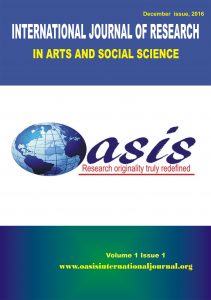CREATING DEVIANCE: THE ISSUE OF KIDNAPPING IN NIGERIA
¹Chigoziri U. Jeribe and ²Emmanuel Nlemchukwu C.
¹Department of Sociology, Federal Polytechnic Nekede, Owerri, Nigeria
²Department of Social Sciences, University of Portharcourt, Rivers State, Nigeria
International Journal of Arts and Social Sciences (IJRASS)
Oasis International Journal Series
Vol. 1 No. 1
December 2016

Abstract
The concept of kidnapping and the worrisome challenges, effects and eventual consequences it portends to any growing economy like Nigeria and the world over has been a subject matter of serious concern to both policy makers, government, political leaders as well as all stakeholders interested in the socio-economic advancement of any given nation. Most literature attributes its pervasiveness to unemployment, poverty, illiteracy and other problems besetting mankind. On this premise, we formed the basis for this study. Extant literature were consulted and overhauled all aimed at getting to a concise critique of this social scourge/malady. The researchers explored the subject matter as it concerns Nigeria where kidnapping has dramatically become an unavoidable source of livelihood/organized business to a lot of people particularly the teeming youth. The paper traced the root of kidnapping in Nigeria to the clamor for oil resource control by the aborigines of the oil producing Niger Delta region who resorted to hostage taking, hijacking and kidnapping of oil workers to challenge government’s hegemonic control over oil resources. Robert K. Merton’s Strain Theory was employed as a theoretical framework to interrogate how contradictions within Nigeria’s social structure and cultural values create deviance. At the end, various recommendations were advanced to aid policy makers, the government and concerned institutions on possible ways of bringing this social problem to its minimal level, one of which is that government at all levels should formulate and effectively implement policies and strategies aimed at addressing the root causes of kidnapping such as poverty, unemployment, environmental degradation and political and economic marginalization.
Keywords: Crime, Deviance, Kidnapping.

Open Access
This is an open access journal which means that all the content is freely available without charge to the user or his/her institution. Users are allowed to read, download, copy, print, search, or link to the full texts of the articles for their personal use, and/or use them for any other lawful purpose, without asking prior permission from the publisher or the author. This is in accordance with the BOAI definition of open access.

Oasis International Journal
Research originality truly redefined
Oasis International Journal (OIJ), a subsidiary of Oasis International Development Foundation (nonprofit organisation) is a broad-based publisher of quality open access journals and delivers this research to the widest possible audience. We achieve this by working closely with our society partners and authors in order to provide them with publishing services that support their research needs

Authors Guideline
Papers submitted should follow the Oasis International Journal authors’ guideline and not be under concurrent consideration at another journal.
Any potential data overlap with previous studies should be noted and described in the letter to the Editor.
